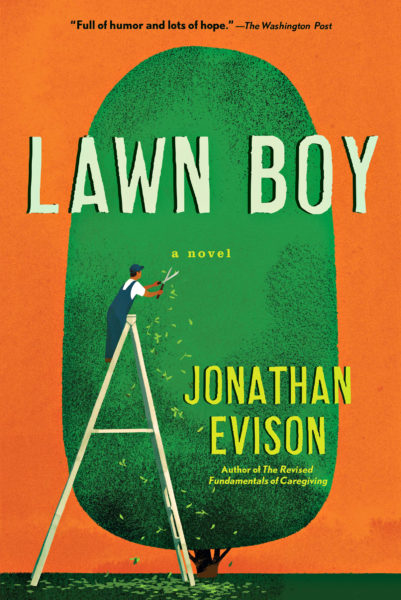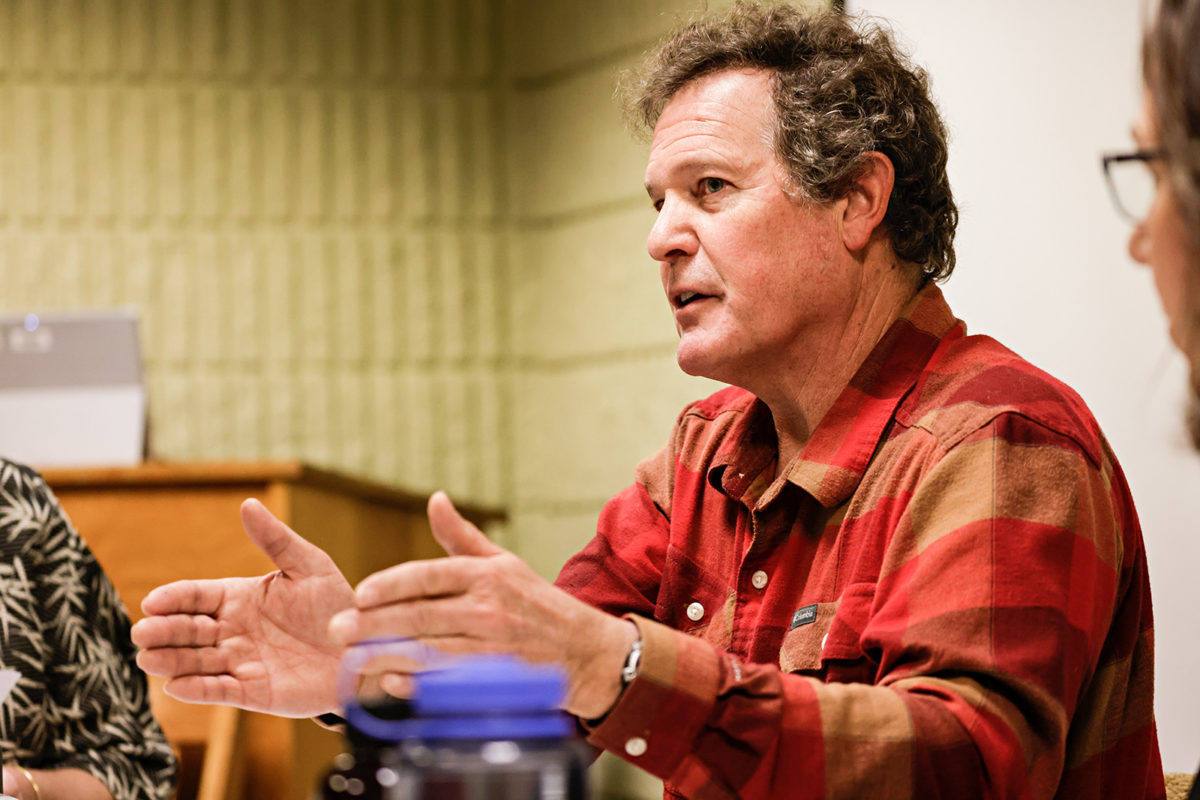Library Board Splits Vote on Challenged Books
The ImagineIF Trustees voted to retain ‘Lawn Boy,’ but indefinitely suspended discussion over ‘Gender Queer’; will seek policy rewrite on controversial titles
By Micah Drew
Bob Lopp was the first to speak up during the allotted public comment period at a Jan. 13 ImagineIF Library Board of Trustees meeting, which centered on the Flathead County institution’s policies for removing controversial books from its materials collection.
“I want to voice my objection frankly to all the quilting books we have and are spending money on. It’s tearing at the fabric of society,” he said to the crowd of nearly 50 people crammed into the basement meeting room.
The joke was a brief moment of levity in the two-hour trustees meeting that centered on citizen complaints over two books, “Lawn Boy” by Jonathan Evison and “Gender Queer” by Maia Kobabe, which have been at the center of a heated debate in school libraries across the country, as well as several public libraries, due to what complainants characterize as their sexually explicit content.
By the end of the meeting, trustees voted unanimously to retain “Lawn Boy” in the library’s collection. The vote to keep “Gender Queer” failed, with trustees Connie Leistiko and Marsha Sultz voting in favor, and trustees Doug Adams, Dave Ingram and Heidi Roedel abstaining. In a follow-up motion, the trustees voted 3-2 along the same lines to indefinitely suspend discussion and the removal vote for “Gender Queer,” in anticipation of forthcoming changes to the materials collection policy.

More than 20 people spoke during the public comment period, including Carmen Cuthbertson, one of the original complainants.
“We are actually having a healthy discussion about the allocation of public funds,” Cuthbertson said. “Challenging a book is not a bad thing. A challenge is a good thing because it leads to a discussion. I wanted to talk about the content, standard, format and age appropriateness of this one book in relation to Flathead County Library. I care about this one because I have skin in the game — I pay for this library just like you do.”
A majority of the public comment was in favor of keeping the books.
Patty Jones, a former ImagineIF librarian, said she could only remember a handful of materials challenged in her 30 years with the library.
“The library is a community place, and so it should be all inclusive for everyone,” she said. “It’s an individual choice to walk in. There should be something for everyone in the library and there should be something to offend everyone in the library. That’s what makes it complete.”
A second moment of levity broke up the hour of public discussion when Stacy Dietz, a former teacher and school counselor responded to the reading of an explicit “Gender Queer” passage by meeting attendee Jonathan Bowden.
“A fire started building in me listening to the gentleman read, because he hasn’t read romance novels,” she said. “Although it’s uncomfortable to listen to some of those words in a room full of people, there are a number of books that would make anyone red in the face.”
There should be something for everyone in the library and there should be something to offend everyone in the library.
Patty Jones speaking at the ImagineIF Library board of trustees meeting
Several other community members spoke against what they characterized as obscenity in “Gender Queer,” questioning whether such materials were illegal under state and federal laws.
“How much do you have in your legal defense fund to defend the library against criminal prosecution under the law?” asked Constance Neumann.
Under Montana Code Annotated (MCA), trustees and staff of libraries do not violate obscenity laws as long as the material is “acquired by the library and disseminated in accordance with policies approved by the governing body of the library.”
Trustee Doug Adams said board members shouldn’t be okay with that loophole.
“If the best we can do is say we get out of this on a technicality, then we’ve set the bar pretty darn low,” Adams said.
After public comment ended, the trustees discussed both books beginning with “Lawn Boy.”
Senior Librarian Sean Anderson, a member of the four-person committee selected by former interim director Martha Furman to evaluate the books, read the staff’s memo. The committee unanimously recommended retaining the book.
“When staff collects books, they are supposed to look at the literary value of them,” said trustee Adams in response. “This guy’s a good writer, he’s witty. I think the book was a compelling story, it was well written, but I feel bad for the trees because if he’d taken out the bad language it would have been half as long.”
In a roll call vote, all five trustees voted in favor of keeping the book.

As the discussion moved to “Gender Queer,” Anderson said the committee reached the same unanimous conclusion to keep the book in the collection.
Trustee Ingram said he was dismayed that the staff recommendation did not mention the possibility that the book might be in violation of MCA, stating he believed a page of the book depicted pedophilic pornography, a clear MCA violation.
“Unfortunately, our current policy as written does not allow us to make any decision other than affirmation. There’s no other option,” Ingram said. “I recognize that I will follow the policy but it makes a mockery of community input if you don’t agree with a selection.”
“Our job is not to pass judgment or to assess the content of these materials as they are selected,” Anderson responded, adding that the collection policy has been in place for years and was reaffirmed by at least three iterations of the board of trustees.
“Nowhere in this policy does it talk about the library’s role in assessing appropriateness, judging whether something is pornographic or if it is illegal in some way. The courts have consistently maintained that that is their responsibility, not the responsibility of the library and not the responsibility of library trustees.”
Anderson pointed out that “Gender Queer” has won national awards, clearly making it of literary value.
“Based on the application of our policy, it more than fulfills many of those things,” Anderson said. “And I want to be very clear that this is our policy, this is our language — nowhere in our policy does it require that we take ALA (American Library Association) guidance in selecting these.”
Adams, who called the book’s writing and imagery “amateurish,” said that the board should be able to make its own decisions about materials.
“If all we do is follow recommendations of staff or the Foundation or the Friends of the Library, then we really don’t need to be here,” he said, referring to the ImagineIF’s nonprofit boosters.
“The fact of the matter is, the board has been tasked with the responsibility to make decisions and the board has the authority to do that,” Adams continued. “But we’re hamstrung. Everybody wants to talk about freedom and the First Amendment and all that kind of stuff and how we’re infringing on your freedom, yet our hands are tied. We have no freedom whatsoever.”

Adams and Roedel called for the vote, with trustees Leistiko and Sultz voting in favor of keeping the book while the other three abstained, failing the motion.
In a follow-up motion, trustee Adams motioned to remove the book from the collection. Trustee Ingram added a subsidiary motion to indefinitely postpone the decision on removal saying that “as the policy’s currently written, there’s no avenue for removal.”
Leistiko and Sultz both objected to the notion of postponing a decision until the policy was rewritten.
“We’re talking about changing the rules in the middle of the game,” interjected Anderson. “This board has made it clear that they feel they have no latitude to remove a book from the library, so they want to change the rules to allow themselves to do that. I think that is a bad decision.”
Roedel, the board chair, objected to that interpretation.
“We had a challenge from a citizen, and as a trustee I don’t feel that the citizen can be heard because of our policies,” Roedel said. “We’re in a real pickle.”
“The reason the policy is there, the reason why the Constitution is there is not to tell you you cannot make these decisions,” Anderson responded. “It’s there to tell you that there are consequences for doing these things. Your hands are not tied. And if you are bravely standing up for what you believe in and that you think removing this book is in the best interest of the community and the people that we heard from today, then be brave, and remove it.”
Trustee Adams responded that he had spoken with the county attorney and was trying to work within the parameters of the law.
In a 3-2 vote, Roedel, Adams and Ingram approved the motion to indefinitely suspend discussion over the removal of “Gender Queer.”
According to ImagineIF policy, until a removal vote passes, the challenged title will remain in the collection.
Speaking after the meeting, Adams said he has already rewritten the policies and will implement them “sooner rather than later,” adding that he is no longer inclined to wait for the new library director to begin.
In another contentious vote that recently displayed the board’s division, trustees voted last week to hire a new library director, doing so over the objections of library personnel.
“I was going to stand up for my choice at all costs, but I know we’ll get sued and the county attorney said we’d lose the lawsuit because we’re violating our policy,” Adams said. “But we have a right to change policy, and when we do that, it will give us the ability to make an intelligent decision.”
“I hope to goodness that we never try to get rid of a book again,” he added. “I can tell you this; if we have a library director or staff that picks appropriate material in the first place, this will no longer be an issue.”